
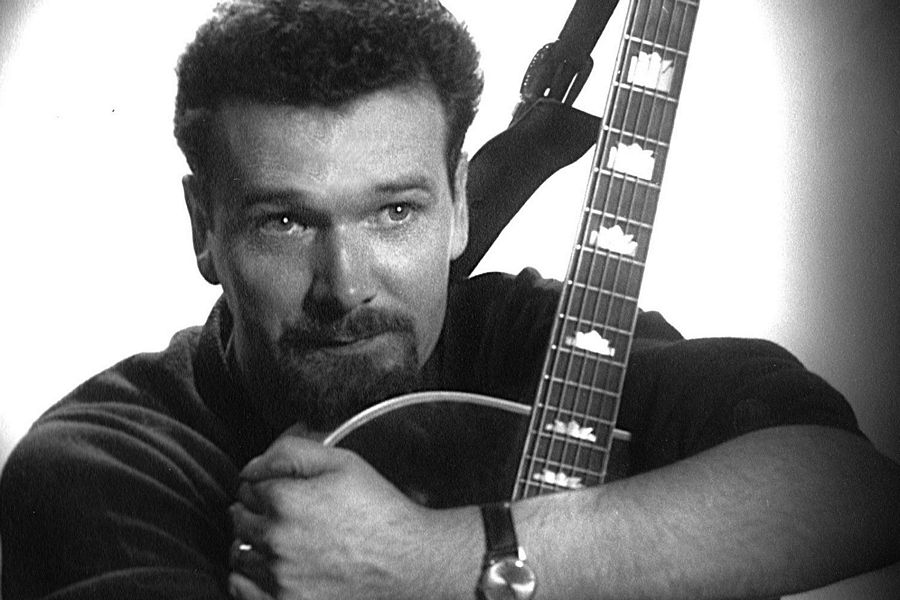
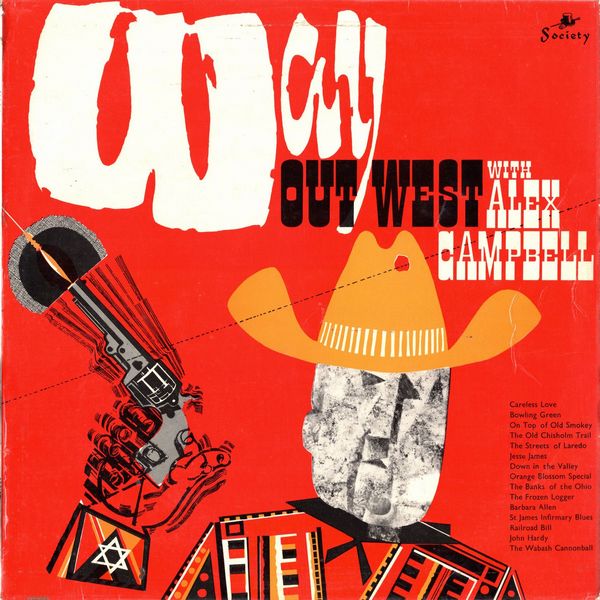 |
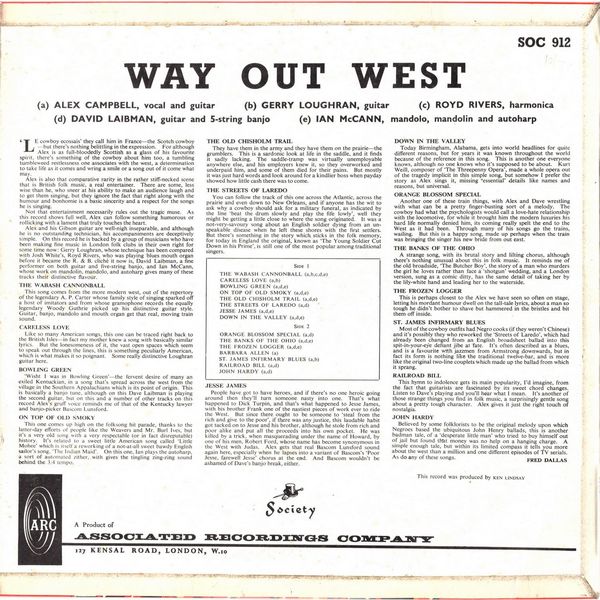
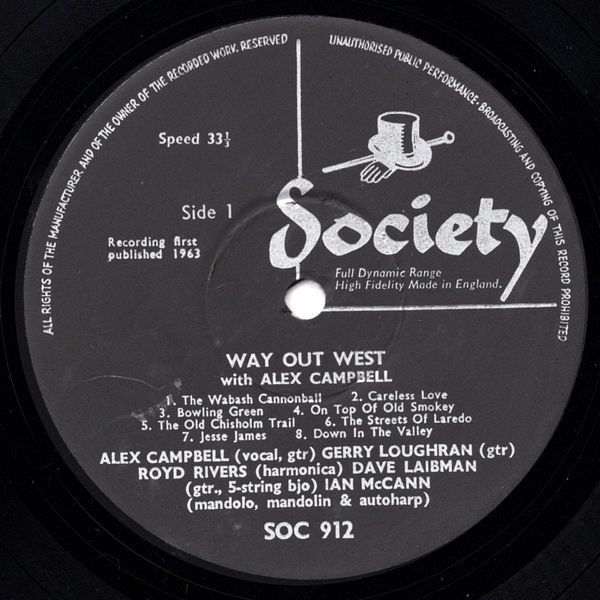
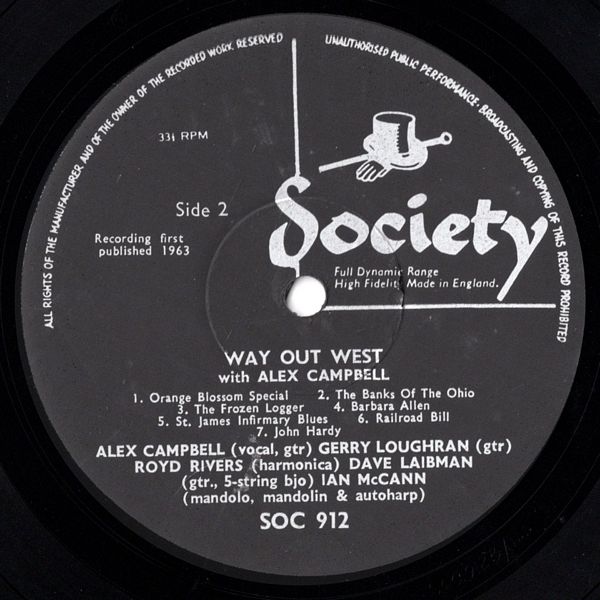
|
"Le cowboy ecossais" they call him in France — the Scotch cowboy — but there's nothing belittling in the expression. For although Alex is as full-bloodedly Scottish as a glass of his favourite spirit, there's something of the cowboy about him too, a tumbling tumbleweed restlessness one associates with the west, a determination to take life as it comes and wring a smile or a song out of it come what may.
Alex is also that comparative rarity in the rather stiff-necked scene that is British folk music, a real entertainer. There are some, less wise than he, who sneer at his ability to make an audience laugh and to get them singing, but they ignore the fact that right along with the humour and bonhomie is a basic sincerity and a respect for the songs he is singing.
Not that entertainment necessarily rules out the tragic muse. As this record shows full well, Alex can follow something humorous or rollicking with a lament that truly touches the heart.
Alex and his Gibson guitar are well-nigh inseparable, and although he is no outstanding technician, his accompaniments are deceptively simple. On this record he is backed by a group of musicians who have been making fine music in London folk clubs in their own right for some time now: Gerry Loughran, whose technique has been compared with Josh White's, Royd Rivers, who was playing blues mouth organ before it became the R. & B. cliche it now is, David Laibman, a fine performer on both guitar and five-string banjo, and Ian McCann, whose work on mandolin, mandolo, and autoharp gives many of these tracks their distinctive flavour.
THE WABASH CANNONBALL — This song comes from the more modern west, out of the repertory of the legendary A. P. Carter whose family style of singing sparked off a host of imitators and from whose gramophone records the equally legendary Woody Guthrie picked up his distinctive guitar style. Guitar, banjo, mandolo and mouth organ get that real, moving train sound.
CARELESS LOVE — Like so many American songs, this one can be traced right back to the British Isles — in fact my mother knew a song with basically similar lyrics. But the lonesomeness of it, the vast open spaces which seem to speak out through the lines, this is something peculiarly American, which is what makes it so poignant. Some really distinctive Loughran guitar here.
BOWLING GREEN — 'Wisht I was in Bowling Green' — the fervent desire of many an exiled Kentuckian, in a song that's spread across the west from the village in the Southern Appalachians which is its point of origin. This is basically a banjo tune, although on this Dave Laibman is playing the second guitar, but on this and a number of other tracks on this record Alex's gruff voice reminds me of that of the Kentucky lawyer and banjo-picker Bascom Lunsford.
ON TOP OF OLD SMOKY — This one comes up high on the folksong hit parade, thanks to the latter-day efforts of people like the Weavers and Mr. Burl Ives, but it's a very old song with a very respectable (or in fact disreputable) history. It's related to a sweet little American song called 'Little Mohee' which is itself a reworking of a not-at-all sweet bawdy English sailor's song. The Indian Maid'. On this one. Ian plays the autoharp, a sort of automated zither, with gives the tingling zing-zing sound behind the 3/4 tempo.
THE OLD CHISHOLM TRAIL — They have them in the army and they have them on the prairie — the grumblers. This is a sardonic look at life in the saddle, and it finds it sadly lacking. The saddle-tramp was virtually unemployable anywhere else, and his employers knew it, so they overworked and underpaid him, and some of them died for their pains. But mostly it was just hard words and look around for a kindlier boss when payday showed how little cash there was to come.
THE STREETS OF LAREDO — You can follow the track of this one across the Atlantic, across the prairie and even down to New Orleans, and if anyone has the wit to ask why a cowboy should ask for a military funeral, as indicated by the line 'beat the drum slowly and play the fife lowly', well they might be getting a little close to where the song originated. It was a not-very-savoury song about an English soldier dying from an unspeakable disease when he left these shores with the first settlers. But there's something in the story which, sticks in the folk memory, for today in England the original, known as The Young Soldier Cut Down in his Prime', is still one of the most popular among traditional singers.
JESSE JAMES — People have got to have heroes, and if there's no one heroic going around then they'll turn someone nasty into one. That's what happened to Dick Turpin, and that's what happened to Jesse James, with his brother Frank one of the nastiest pieces of work ever to ride the West. But since there ought to be someone to 'steal from the rich and give to the poor', if there was any justice, this laudable habit got lacked on to Jesse and his brother, although he stole from rich and poor alike and put all the proceeds into his own pocket. He was killed by a trick, when masquerading under the name of Howard, by one of his men, Robert Ford, whose name has become synonymous in the West with Judas. Alex gets that real Bascom Lunsford sound again here, especially when he lapses into a variant of Bascom's 'Poor Jesse, farewell Jesse' chorus at the end. And Bascom wouldn't be ashamed of Dave's banjo break, either.
DOWN IN THE VALLEY — Today Birmingham, Alabama, gets into world headlines for quite different reasons, but for years it was known throughout the world because of the reference in this song. This is another one everyone knows, although no one knows who it's supposed to be about. Kurt Weill, composer of The Threepenny Opera', made a whole opera out of the tragedy implicit in this simple song, but somehow I prefer the story as Alex sings it, missing 'essential' details like names and reasons, but universal.
ORANGE BLOSSOM SPECIAL — Another one of these train things, with Alex and Dave wrestling with what can be a pretty finger-busting sort of a melody. The cowboy had what the psychologists would call a love-hate relationship with the locomotive, for while it brought him the modern luxuries his hard life normally denied him, its coming really spelt the end to the West as it had been. Through many of his songs go the trains, wailing. But this is a happy song, made up perhaps when the train was bringing the singer his new bride from out east.
THE BANKS OF THE OHIO — A strange song, with its brutal story and lilting chorus, although there's nothing unusual about this in folk music. It reminds me of the old broadside, The Butcher Boy', the story of a man who murders the girl he loves rather than face a 'shotgun' wedding, and a London version, sung as a comic ditty, has the same detail of taking her by the lily-white hand and leading her to the waterside.
THE FROZEN LOGGER — This is perhaps closest to the Alex we have seen so often on stage, letting his mordant humour dwell on the tall-tale lyrics, about a man so tough he didn't bother to shave but hammered in the bristles and bit them off inside.
ST. JAMES INFIRMARY BLUES — Most of the cowboy outfits had Negro cooks (if they weren't Chinese) and it's possibly they who reworked the 'Streets of Laredo', which had already been changed from an English broadsheet ballad into this spit-in-your-eye defiant jibe at fate. It's often described as a blues, and is a favourite with jazzmen from Armstrong downwards, but in fact its form is nothing like the traditional twelve-bar, and is more like the original two-line couplets which made up the ballad from which it sprang.
RAILROAD BILL — This hymn to indolence gets its main popularity, I'd imagine, from the fact that guitarists are fascinated by its sweet chord changes. Listen to Dave's playing and you'll hear what I mean. It's another of those strange things you find in folk music, a surprisingly gentle song about a pretty tough character. Alex gives it just the right touch of nostalgia.
JOHN HARDY — Believed by some folklorists to be the original melody upon which Negroes based the ubiquitous John Henry ballads, this is another badman tale, of a 'desperate little man' who tried to buy himself out of jail but found that money was no help on a hanging charge. A simple enough tale, but within its limited compass it tells you more about the west than a million and one different episodes of TV serials. As do any of these songs.
FRED DALLAS